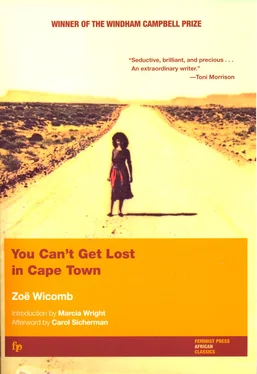I watch him at the front of the bus. His right thumb strums an impatient jingle on the silver levers, the leather bag is cradled in the hand into which the coins tumble. He chants a barely audible accompaniment to the clatter of coins, a recitation of the newly decimalised currency. Like times tables at school and I see the fingers grow soft, bending boyish as they strum an ink-stained abacus; the boy learning to count, leaning earnestly with propped elbows over a desk. And I find the image unaccountably sad and tears are about to well up when I hear an impatient empty clatter of thumb-play on the coin dispenser as he demands, ‘All fares please’ from a sleepy white youth. My hand flies into my handbag once again and I take out the purse. A man’s leather purse.
Michael too is boyish. His hair falls in a straight blond fringe into his eyes. When he considers a reply he wipes it away impatiently, as if the hair impedes thought. I cannot imagine this purse ever having belonged to him. It is small, U-shaped and devoid of ornament, therefore a man’s purse. It has an extending tongue that could be tucked into the mouth or be threaded through the narrow band across the base of the U. I take out the smallest note stuffed into this plump purse, a five-rand note. Why had I not thought about the busfare? The conductor will be angry if my note should exhaust his supply of coins although the leather bag would have a concealed pouch for notes. But this thought does not comfort me. I feel angry with Michael. He has probably never travelled by bus. How would he know of the fear of missing the unfamiliar stop, the fear of keeping an impatient conductor waiting, the fear of saying fluently, ‘Seventeen cents please,’ when you are not sure of the fare and produce a five-rand note? But this is my journey and I must not expect Michael to take responsibility for everything. Or rather, I cannot expect Michael to take responsibility for more than half the things. Michael is scrupulous about this division; I am not always sure of how to arrive at half. I was never good at arithmetic, especially this instant mental arithmetic that is sprung on me.
How foolish I must look sitting here clutching my five-rand note. I slip it back into the purse and turn to the solidity of the smoking women. They have still made no attempt to find their fares. The bus is going fast and I am surprised that we have not yet reached Mowbray. Perhaps I am mistaken, perhaps we have already passed Mowbray and the women are going to Sea Point to serve a nightshift at the Pavilion.
Marge, Aunt Trudie’s eldest daughter, works as a waitress at the Pavilion but she is rarely mentioned in our family. ‘A disgrace,’ they say. ‘She should know better than to go with white men.’
‘Poor whites,’ Aunt Trudie hisses. ‘She can’t even find a nice rich man to go steady with. Such a pretty girl too. I won’t have her back in this house. There’s no place in this house for a girl who’s been used by white trash.’
Her eyes flash as she spits out a cherished vision of a blond young man sitting on her new vinyl sofa to whom she serves gingerbeer and koeksisters, because it is not against the law to have a respectable drink in a Coloured home. ‘Mrs Holman,’ he would say, ‘Mrs Holman, this is the best gingerbeer I’ve had for years.’
The family do not know of Michael even though he is a steady young man who would sit out such a Sunday afternoon with infinite grace. I wince at the thought of Father creaking in a suit and the unconcealed pleasure in Michael’s successful academic career.
Perhaps this is Mowbray after all. The building that zooms past on the right seems familiar. I ought to know it but I am lost, hopelessly lost, and as my mind gropes for recognition I feel a feathery flutter in my womb, so slight I cannot be sure, and again, so soft, the brush of a butterfly, and under cover of my handbag I spread my left hand to hold my belly. The shaft of light falling across my shoulder, travelling this route with me, is the eye of God. God will never forgive me.
I must anchor my mind to the words of the women on the long seat opposite me. But they fall silent as if to protect their secrets from me. One of them bends down heavily, holding on to the jaws of her shopping bag as if to relieve pressure on her spine, and I submit to the ache of my own by swaying gently while I protect my belly with both hands. But having eyed the contents of her full bag carefully, her hand becomes the beak of a bird dipping purposefully into the left-hand corner and rises triumphantly with a brown paper bag on which grease has oozed light-sucking patterns. She opens the bag and her friend looks on in silence. Three chunks of cooked chicken lie on a piece of greaseproof paper. She deftly halves a piece and passes it to her thin friend. The women munch in silence, their mouths glossy with pleasure.
‘These are for the children,’ she says, her mouth still full as she wraps the rest up and places it carelessly at the top of the bag.
‘It’s the spiced chicken recipe you told me about.’ She nudges her friend. ‘Lekker hey!’
The friend frowns and says, ‘I like to taste a bit more cardamom. It’s nice to find a whole cardamom in the food and crush it between your teeth. A cardamom seed will never give up all its flavour to the pot. You’ll still find it there in the chewing.’
I note the gaps in her teeth and fear for the slipping through of cardamom seeds. The girls at school who had their two top incisors extracted in a fashion that raged through Cape Town said that it was better for kissing. Then I, fat and innocent, nodded. How would I have known the demands of kissing?
The large woman refuses to be thwarted by criticism of her cooking. The chicken stimulates a story so that she twitches with an irrepressible desire to tell.
‘To think,’ she finally bursts out, ‘that I cook them this nice surprise and say what you like, spiced chicken can make any mouth water. Just think, it was yesterday when I say to that one as she stands with her hands on her hips against the stove saying, “I don’t know what to give them today, I’ve just got too much organising to do to bother with food.” And I say, feeling sorry for her, I say, “Don’t you worry about a thing, Marram, just leave it all in cook’s hands (wouldn’t it be nice to work for really grand people where you cook and do nothing else, no bladdy scrubbing and shopping and all that). in cook’s hands,” I said,’ and she crows merrily before reciting: ‘And I’ll dish up a surprise / For Master Georgie’s blue eyes.
‘That’s Miss Lucy’s young man. He was coming last night. Engaged, you know. Well there I was on my feet all day starching linen, making roeties and spiced lentils and sweet potato and all the lekker things you must mos have with cardamom chicken. And what do you think she says?’
She pauses and lifts her face as if expecting a reply, but the other stares grimly ahead. Undefeated she continues, ‘She says to me, “Tiena,” because she can’t keep out of my pots, you know, always opening my lids and sniffing like a brakhond, she says, “Tiena,” and waits for me to say, “Yes Marram,” so I know she has a wicked plan up her sleeve and I look her straight in the eye. She smile that one, always smile to put me off the track, and she say looking into the fridge, “You can have this nice bean soup for your dinner so I can have the remains of the chicken tomorrow when you’re off.” So I say to her, “That’s what I had for lunch today,” and she say to me, “Yes I know but me and Miss Lucy will be on our own for dinner tomorrow,” and she pull a face, “Ugh, how I hate reheated food.” Then she draws up her shoulders as if to say, That’s that.
‘Cheek hey! And it was a great big fowl.’ She nudges her friend. ‘You know for yourself how much better food tastes the next day when the spices are drawn right into the meat and anyway you just switch on the electric and there’s no chopping and crying over onions, you just wait for the pot to dance on the stove. Of course she wouldn’t know about that. Anyway, a cheek, that’s what I call it, so before I even dished up the chicken for the table, I took this,’ and she points triumphantly to her bag, ‘and to hell with them.’
Читать дальше












